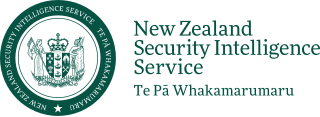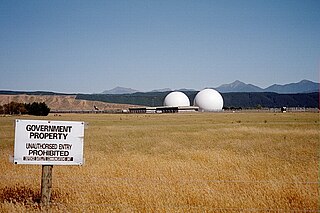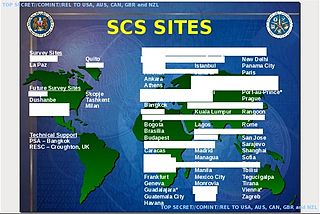
The New Zealand Security Intelligence Service is New Zealand's primary national intelligence agency. It is responsible for providing information and advising on matters including national security and foreign intelligence. It is headquartered in Wellington and overseen by a Director-General, the Minister of New Zealand Security Intelligence Service, and the parliamentary intelligence and security committee; independent oversight is provided by the Inspector-General of Intelligence and Security.

The Government Communications Security Bureau is the public-service department of New Zealand charged with promoting New Zealand's national security by collecting and analysing information of an intelligence nature. The GCSB is considered to be New Zealand's most powerful intelligence agency, and has been alleged to have conducted more espionage and data collection than the country's primary intelligence agency, the less funded NZSIS. This has at times proven controversial, although the GCSB does not have the baggage of criticism attached to it for a perceived failure to be effective like the NZSIS does. The GCSB is considered an equivalent of GCHQ in the United Kingdom or the NSA in the United States.

Timothy John Groser is a New Zealand former politician and diplomat. A member of the New Zealand National Party, Groser was a Member of Parliament between 2005 and 2015. He held the offices of Minister of Trade, Minister of Conservation, and Minister for Climate Change in the Fifth National Government.

The Inspector-General of Intelligence and Security (IGIS) is the official responsible for supervising New Zealand's two main intelligence agencies: the Security Intelligence Service (SIS) and the Government Communications Security Bureau (GCSB).
New Zealand's intelligence agencies and units have existed, with some interruption, since World War II. At present, New Zealand's intelligence community has approximately 550 employees, and has a combined budget of around NZ$145 million.

Andrew James Little is a New Zealand lawyer, former politician and former trade union official. He was Leader of the Labour Party and Leader of the Opposition from 2014 to 2017 and a senior minister in the Labour governments led by Jacinda Ardern and Chris Hipkins from 2017 to 2023, including as Minister for Treaty of Waitangi Negotiations, Minister of Justice, Minister of Health and Minister of Defence.
The Officials Committee for Domestic and External Security Coordination (ODESC) is a New Zealand government committee which gives the Prime Minister strategic policy advice on security and intelligence matters. Operational security matters are handled by other groups, including the Defence Force, the Ministry of Defence, the Security Intelligence Service, the Government Communications Security Bureau and Police.
The Parliamentary Counsel Office is New Zealand's law drafting office. It drafts New Zealand Government Bills and Legislative Instruments. It also publishes all New Zealand Bills, Acts, and Legislative Instruments in print and on the New Zealand Legislation website.

The Copyright Amendment Act 2011 is an Act of the Parliament of New Zealand which amends the Copyright Act 1994.
New Zealand is committed to the Universal Declaration of Human Rights and has ratified the International Covenant on Civil and Political Rights, both of which contain a right to privacy. Privacy law in New Zealand is dealt with by statute and the common law. The Privacy Act 2020 addresses the collection, storage and handling of information. A general right to privacy has otherwise been created in the tort of privacy. Such a right was recognised in Hosking v Runting [2003] 3 NZLR 385, a case that dealt with publication of private facts. In the subsequent case C v Holland [2012] NZHC 2155 the Court recognised a right to privacy in the sense of seclusion or a right to be free from unwanted intrusion. For a useful summary see: court-recognises-intrusion-on-seclusion-privacy-tort-hugh-tomlinson-qc/
The Tangimoana Station is a radio communications interception facility run by the New Zealand Government Communications Security Bureau. It is located 30 kilometres west of Palmerston North.

The Waihopai Station is a secure communication facility, located near Blenheim, run by New Zealand's Government Communications Security Bureau. The station started operating in 1989, and collects data that is then shared with New Zealand's allies. In 2021, it was announced that the parts of the station would be deconstructed and removed from the site. Several protests and disputes surrounding its use and the wider implications of the information gathered has gained the facility some local and international notoriety.

STATEROOM is the code name of a highly secretive signals intelligence collection program involving the interception of international radio, telecommunications and Internet traffic. It is operated out of the diplomatic missions of the signatories to the UKUSA Agreement and the members of the ECHELON network including Australia, New Zealand, United Kingdom, Canada and the United States.
The Human Rights Foundation of Aotearoa New Zealand is a non-governmental organisation in New Zealand, which seeks "to promote and defend human rights through research based education and advocacy."

The Minister for National Security and Intelligence is a minister in the New Zealand Government who is responsible for leading and setting the policies and legislative framework of New Zealand's national security system. The current minister is Christopher Luxon, who is also the current Prime Minister of New Zealand, as by convention, the National Security and Intelligence portfolio is always held by the Prime Minister.

The Investigatory Powers Act 2016 is an Act of the Parliament of the United Kingdom which received royal assent on 29 November 2016. Its different parts came into force on various dates from 30 December 2016. The Act comprehensively sets out and in limited respects expands the electronic surveillance powers of the British intelligence agencies and police. It also claims to improve the safeguards on the exercise of those powers.
The Water Services Reform Programme was a public infrastructure restructuring programme launched by the Sixth Labour Government to centralise the management of water supply and sanitation in New Zealand. It originally proposed shifting control of stormwater, drinking water and wastewater management from the country's 67 local councils to several new publicly-owned regional entities by July 2024. Details of the proposed reforms were announced in October 2021. The Three Waters reforms were criticised by several mayors and the opposition National and ACT parties.

The Director-General of the GCSB is the leader of the Government Communications Security Bureau, commonly abbreviated as the GCSB. The organisation is considered the most powerful and influential of the New Zealand intelligence agencies, and has been headed by Andrew Hampton since April 2016. The Director-General of the GCSB is appointed by the Prime Minister without the consultation of Parliament, and the Director makes reports directly to him or her.

The Russia Sanctions Act 2022 is an Act of Parliament passed by the New Zealand Parliament that establishes the framework for autonomous sanctions against Russia in response to its 2022 invasion of Ukraine. This legislation would allow sanctions to be placed on those responsible for or associated with the Russian invasion of Ukraine including people, services, companies and assets. The Sanctions Act also allows for sanctions to be imposed on other states complicit with Russian aggression including Belarus. On 9 March 2022, the Russian Sanctions Act passed with unanimous support from all parties represented in Parliament.
New Zealand Parliamentary Service is an agency established in 1985 to provide support services to the New Zealand's elected Members of Parliament (MPs). Their services are outlined in the Parliamentary Services Act 2000. Parliamentary Service employs the staff of the MP's including those in electorate and community offices and also operates Parliament’s corporate functions such as asset management and Information Communications Technology (ICT). They are also responsible for the Parliamentary Library.









